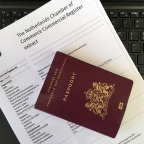
Do you pay your fair share of Taxes? (Tax Integrity and KYC).
Banks worry about serving clients that could be accused of immoral and unethical behaviour, like not paying enough taxes. Politicians, society and regulators expect banks to prevent their services from being misused. Therefore, banks are expected to develop an appropriate risk model and take reasonable measures. Unexpectedly the OECD and G20 seem to assist. Continue reading Do you pay your fair share of Taxes? (Tax Integrity and KYC).






